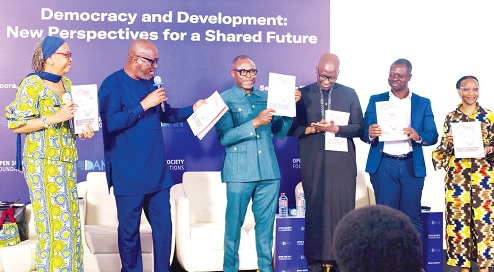Policymakers, academics, and civil society leaders have issued an urgent call for African governments to pursue deep democratic reforms to ensure economic justice and restore public trust.
They argued that while democracy remained popular across the continent, its failure to deliver tangible economic opportunities had fuelled widespread frustration, particularly among a youth population that felt marginalised and excluded from development benefits.
The call to action was made last Monday, at the University of Ghana, Legon, during the launch of a landmark study titled 'Analysis of the Nexus Between Democratic Governance and Economic Justice in Africa'.
Organised by the Open Society Foundations (OSF) in partnership with the International Development Economics Associates (IDEAS), the event coincided with the International Day of Democracy.
Homegrown solutions
Professor Henry Kwesi Prempeh, Executive Director of the Ghana Centre for Democratic Development (CDD-Ghana) and Chair of the Ghana Constitutional Review Committee, who delivered the key note address stated that post-1990s reforms had focused too narrowly on elections, ignoring critical issues of power, accountability, and economic governance.
“Democracy in Africa is not failing because people reject it. Afrobarometer data shows strong support for democracy, even as dissatisfaction with its results grows.
The problem is not demand; it is supply.
We have yet to build a democracy that truly meets people’s needs,” Prof. Prempeh noted.
He criticised the continent's reliance on imported democratic models from the West instead of developing homegrown systems that reflect African realities.
He identified unregulated campaign financing as a critical flaw, proposing concrete reforms like capping billboard sizes, setting clear campaign periods, and regulating rallies to slash exorbitant election costs.
“We cannot imitate countries with stronger administrative capacities.
We must design democratic solutions that work for us,” he stressed.
Research findings
The Africa Director for Research and Policy at the IDEAS, Dr Ndongo Samba Sylla, presented the research report, describing Africa’s democracies as “choiceless,” hemmed in by neoliberal policies and lack of economic independence that prevented governments from pursuing transformative development agenda.
This, he explained, perpetuated inequality, unemployment, and youth disillusionment.
Dr Chukwuemeka Eze of Open Society underscored the centrality of the findings of the report at a time when young people all around the world were pushing for democracy that delivered dignity to the people.
He said, for instance, the Democratic Futures in Africa programme of Open Society Foundations aims to establish inclusive, socially cohesive, rights-based and just African democracies rooted in Ubuntu principles— shared humanity.
The study’s bold recommendations include universal access to financial and identification systems, increased control over natural resources, institutionalised citizen engagement in policymaking, and guaranteed access to essential services.
Other panelists including African Futures Lab’s Dr. Liliane Umubyeyi, and historian, Dr. Amzat Boukari-Yabara, detailed how neocolonial structures—like foreign control over currencies and resources—continue to undermine economic sovereignty.
They called for decentralising power, enhancing citizen participation, and dismantling exploitative economic systems that block inclusive growth.

